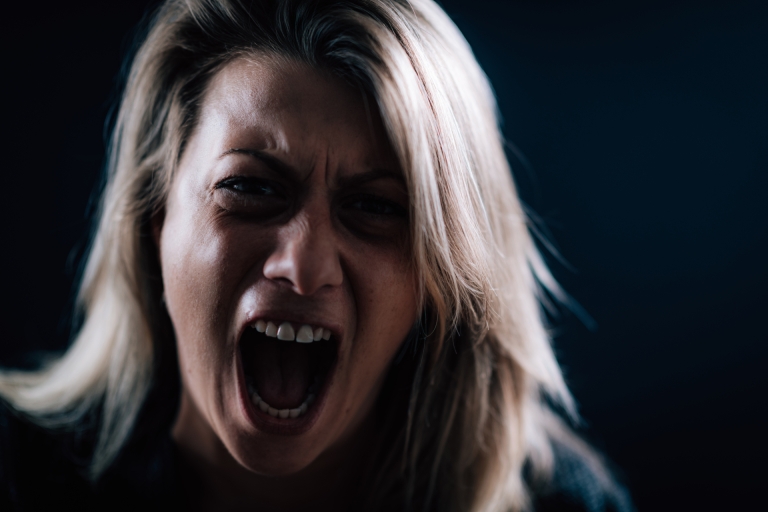Anger
As a parent who has lost a child, you now realize how cruel reality was to you and feel a lot of rage and anger - you'll find yourself blaming everyone and everything and trying to find something that was guilty for your tragedy.

Anger is actually a completely natural part of every grieving process, especially when it comes to the loss of a child.
You've been through shock and denial, and when the reality came a bit clearer, that's when you'll start experiencing fury and anger.
Anger is also more common among fathers who have lost their precious children because we still live in a society that doesn't "allow" men to express their emotions in a natural manner.
Besides that, many fathers also feel a burden on their shoulders trying to do everything in their power to make a grieving mother feel at least a little bit better.
What you'll experience in anger stage of the grieving process is usually related to:
1. Thinking about revenge. This is especially true for parents who have lost their children due to some sort of an accident, let's say a car accident. You may have a lot of thoughts that are full of hatred and anger, planning revenge on some people, or thinking that this will help you make justice right.
These thoughts can be very heavy and toxic and I believe that people who don't know how to deal with them actually haven't heard of the stages of every grieving process, especially the one that's related to the loss of a child.
What to do with the negative and obsessive thoughts?
It's the same with all obsessive thoughts - don't try to fight them, just ignore them. When you don't do anything with such thoughts, they'll disappear with time.
2. Trying to find someone to blame. You want to know why has such a tragedy happened to you and you'll start thinking about who to blame if you could have changed something in the past or done in a different manner - what's important to know about such thoughts that'll come to your mind is that you should try to do everything in your power to live in the present moment.
I know that you don't feel good in the present moment and that it may be easier for you to focus on finding someone to blame, but you cannot change the past.
This is the period of time when you can also experience panic attacks. Those can include various physical and mental sensations, such as:
Feeling like you're having a heart attack;
Staying without breath;
Tingles in your hands and feet – electric shocks through the entire body;
Feeling suddenly very hot or very cold;
Nausea & vomiting;
Flashbacks;
Derealization;
Extreme anxiety;
Death-related thoughts;
Feeling lost and like you cannot control your mind and body;
+more...
There are some amazing tips & tricks when it comes to panic attacks I would like to share with you. Panic attack disappears once you "come back to reality", or better said - focus on the presence and not the past. This is what you should do - it's simple and works:
-Look around yourself and try to count at least 10 red or green objects;
-Focus on the smells that surround you;
-Check what date and time it is.
These simple steps will trick your brain to stop a panic attack and thoughts related to the past and bring you back to the present moment.
3. Addiction problems. If you cannot control your anger, you'll probably think about taking alcohol or certain pills to make yourself feel at least a bit better. As always, I will tell you that this may be the perfect moment to seek some professional help. Sometimes, a conversation with a psychologist or a very good friend is the only thing you may need at that moment. Just please don't drown yourself in the addiction - don't ignore the problem but try to solve it, or even better - prevent it.
4. Sleeping problems. During this period of time, you may also experience insomnia. On the other hand, some people feel so exhausted after the end of the day that they need more sleep than usual. It may not be weird to find yourself sleeping even for 15 hours.
5. Arguing with a lot of people. Everything will trigger you easily, so be aware that you don't get into serious arguments and fights with others.
What to do to help yourself get through the anger stage of a grieving process?
*Take up some sport. It's very useful to take your anger out through something that can even help you feel physically better and take care of your health. If you don't practice sports already, I highly recommend trying something that makes you happy. You may meet some new people while practicing a new sport, so why not make some new friends?
*Create a safe place. Create a safe place in your home or anywhere else you like. Fulfill that space with some of your child's memories, like toys, clothes, or anything that is special to you. Create some time in the day when you'll be there, express your emotions, and feel however you want to feel at that moment.
*Transform your energy into something useful & creative. You may feel full of energy from time to time, but you may also feel drained. Usually, these processes come one after the other.
When the energy hits, instead of being full of anger, maybe you can think about transforming your energy into something useful or creative. Besides art that I always talk about and mention, you can also think about helping someone or becoming a part of various sorts of altruistic groups. This will help you to feel like you're actually doing something that matters - and yes, that's exactly what you're doing.

